Introduction
The rules and procedures for Mijas La Nueva are a combination of the original statutes, Spanish law, and agreed agenda points put forward and voted upon by the MLN property owners over the years.
The term ‘good neighbour responsibilities’ probably best describes this common set of standards for the benefit of all of MLN’s Owners and visitors.
Owners are responsible for ensuring any guests, maintenance workers, household members, or property renters adhere to the rules set by the community.
The general rules are outlined below.
The full version of the Bylaws can be found on this website in the printable download section under Useful Info.
The term ‘good neighbour responsibilities’ probably best describes this common set of standards for the benefit of all of MLN’s Owners and visitors.
Owners are responsible for ensuring any guests, maintenance workers, household members, or property renters adhere to the rules set by the community.
The general rules are outlined below.
The full version of the Bylaws can be found on this website in the printable download section under Useful Info.
Rules & Procedures
Procedure for non-payment of fees or charges (debtor procedure)
Dealing with the small number of cases of non-payment of community fees or water charges can be very time-consuming for the Committee - and we believe this is time that could be better invested in more productive areas.
All owners are legally requirement to pay fees and charges in a timely manner.
Whenever an owner has any kind of issue with the committee, we are always available to discuss, and we encourage you to get in touch with us. We must emphasize, however, that any form of withholding of fees or charge is not allowed and will be swiftly handled through the appropriate legal channels.
When we do have to deal with cases of non-payment, we apply a debt recovery process. We hope that the chart below will provide clarity and help owners avoid the legal costs that are incurred in cases of delayed or non-payment.
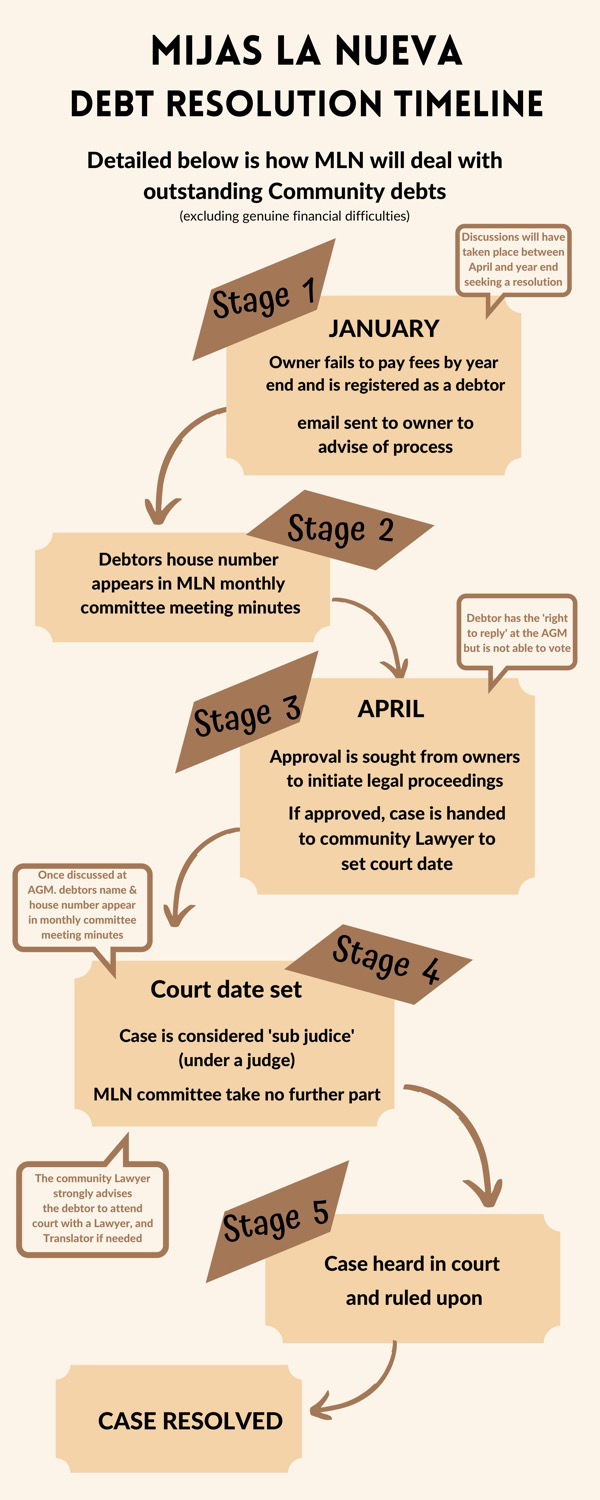
Communal tennis court
We’re thrilled to have this wonderful amenity for everyone in our beautiful urbanisation to enjoy. To make sure it’s fair and accessible for all, please follow these guidelines when booking the court:
🎾 One Hour Per Slot: Please limit your booking to a maximum of one hour per session. Include your house number when booking.
🎾 Plan Ahead Responsibly: Only one booking at a time.
🎾 Cancel If You Can’t Make It: If you’re unable to attend your session, please take a moment to cancel your booking so others can use the court.
Let’s work together to ensure everyone gets a chance to enjoy the tennis court!
🎾 One Hour Per Slot: Please limit your booking to a maximum of one hour per session. Include your house number when booking.
🎾 Plan Ahead Responsibly: Only one booking at a time.
🎾 Cancel If You Can’t Make It: If you’re unable to attend your session, please take a moment to cancel your booking so others can use the court.
Let’s work together to ensure everyone gets a chance to enjoy the tennis court!
Communal swimming pools
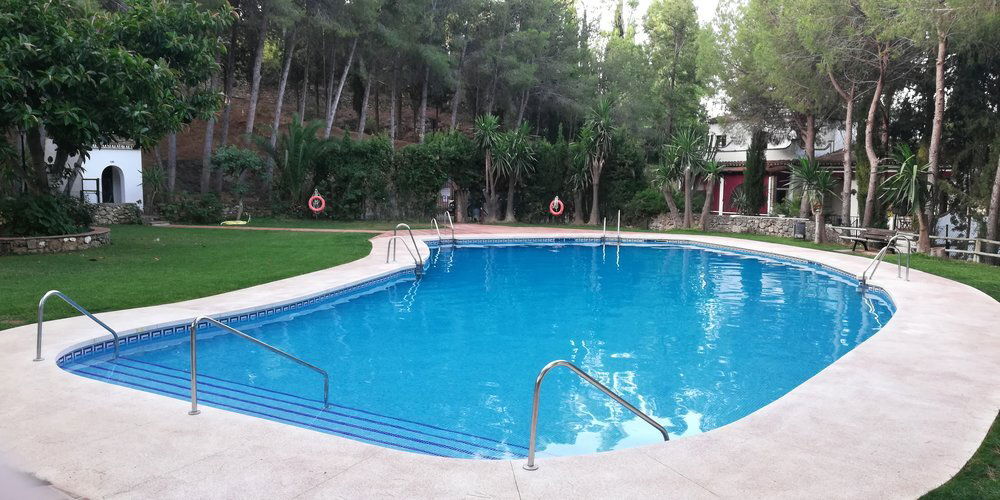
The MLN communal pools are for MLN residents and guests only. The communal pools do not have lifeguards, and by using the pools, you accept any liability.
- Children MUST be supervised at all times and are not permitted to use the pools without adult supervision.
- The pools open at 0800 and close at 23.00 (Automatically by card system)
- Entry to the pools is via a card entry only.
- No animals are allowed in or around the pool for reasons of hygiene.
- Headphones must be used for all music and video devices. No external speakers are to be used for the comfort of others.
- No excessive shouting and noise. Please be aware you are in a residential area.
- No naked swimming! Please be aware the pools are surrounded by homes, and children are around. Wear appropriate swimwear at all times!
- No ball games or inflatables (Spanish law) infant floatation items are ok.
- No glass items around the pool for safety reasons. I.e. bottles, glass, crockery etc.
- Please shower before entering the pool.
- Please dispose of all litter in the provided bins or take it home with you!
- If you use any sun loungers provided, please ensure you clean them before and after use. Please also place them back where you found them after use.
- Sun loungers cannot be reserved. Personal items may be removed from unoccupied sun loungers.
Rules regarding noise
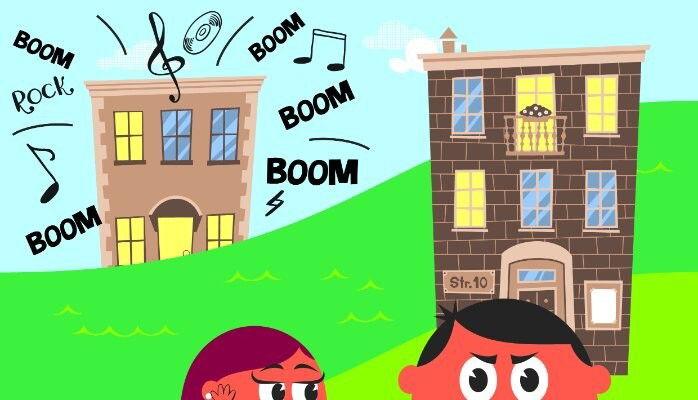
- Please respect the tranquility of the Urbanisation and your neighbours.
- Please ensure that your neighbours and the immediate vicinity are not disturbed by any noise after 24.00 hrs.
- Please respect the afternoon siesta period.
- You should report significant noise disturbance or unruly behavior to the local police (Policía Municipal) on Tel No. 092 The municipal police cover neighbourhood disputes and disturbances.
Trees policies
Requests for trees, large and small, to be cut, pruned or removed are without doubt the largest volume of emails that we receive in the Committee office. Each request is carefully considered, however, when requests are denied, this is almost always due to ecology, accessibility, cost, or local/ national law.
We appreciate this can be a significant source of dissatisfaction, so, in an attempt to aid those requesting the cutting, pruning or removal of trees, and in some cases, bushes, we have listed below a list of frequently asked questions taken from emails received, together with the Committee's response.
Q. Do I have a right to a view?
A. No, You have no legal right to a view, even if the agent you bought your home through suggested you may have or suggested you could cut down trees and prune trees and plants that obstruct your view (which has happened previously) The MLN Committee are also under no obligation to provide a view, however, where possible, we are sympathetic to requests dependent on circumstances.
Q. Can I request for a tree to be pruned?
A. Yes. However, please be aware that we have a large volume of trees, and it is impossible to prune every one of them every year. We typically prune the large trees at a specific time of year, and we also need to hire a "cherry picker" to reach the high trees, which is costly. There are also strict rules and laws around the pruning of trees, so please consult with the committee and ideally provide photos of the tree in question.
Q. Can the committee request the pruning, or removal of a tree on my neighbour's land ?
A. Yes, however we encourage owners to discuss matters like this with their neighbours directly in the first instance. If this is not possible, we are happy to contact them via email on your behalf and put you in touch with each other (if the other owners are ok with us passing on your details). Please note that we cannot force any owner to remove or prune a tree unless it is considered a hazard, at which point we would inform the council if the owner is reluctant to comply.
Q. Can I apply to the council to remove a tree on MLN Community land?
A. No, this can only be done by the serving committee. Any tree, or plant, on communal land that is damaged, cut, pruned, or removed without committee knowledge, or authorisation, will breach the MLN rules and could potentially result in fines being applied by the Town Hall. If you require something removed, cut or pruned, please contact the MLN committee.
Q. Can I request for a tree on MLN community land to be cut down?
A. Yes, you are perfectly entitled to ask. However, permission will not be granted unless the tree is causing structural damage or is a hazard. In the case of structural damage, the committee will need to ensure that the structure was not built too close to, or built after, the tree was already in place. The removal of the tree may also be subject to permission being granted by the Town Hall.
Q. Can I cut down my tree that is on my land?
A. Possibly, however the decision may not be up to the committee; Depending on the situation, you may need to obtain a licence from the council to carry out the removal. Without this, you could be subject to large fines from the council. Please consult with the committee in the first instance as we may be able to advise. We may also need to prepare for any potential disruption. You will also need to ensure your contractor is fully insured in case they cause unexpected damage to your neighbours or MLN land.
Q. How do I apply to the council to cut down a tree on my land?
A. If a tree needs to be removed, you are required to submit an application, and the council sends an inspector to view the tree. You must have a VERY good reason to be removed, such as being a safety concern, causing damage, or being diseased.
If the council agrees to issue a licence for the tree removal, you have to provide a specified amount of replacement trees to the council. The council will then plant those new trees elsewhere in Mijas. This is typically expensive. For example, in 2021, a resident had to pay €1,000 for ten new pine trees to remove one pine tree causing damage to the MLN water pipe.
When you add this cost to the cost of the tree surgeon and disposal costs, it is expensive. The price is linked to the type of tree you are removing.
Q. Why are so many rules associated with pruning and cutting down trees?
A. Mijas Council is so strict on trees not being removed for multiple ecological reasons. The most obvious is that we live on the side of a mountain, and the trees provide a vital service in "soaking up" excess water in the heavy rain seasons to avoid flash floods. This is even more important now that we recently lost thousands of hectares of trees and vegetation in the devastating wildfires around the mountains of MLN.
Q. I ́ve seen a caterpillar nest in a pine tree. What should I do?
A. You should avoid contact at all cost and report any sightings to the MLN Committee. In Spain, pine, and oak trees often become infested with Processionary Caterpillars. This particular species can be harmful to young children and sometimes fatal to cats and dogs. These caterpillars make nests that look like candy floss and travel down the trunk walking ‘conga style’ across the ground, hence the name, Processionary Caterpillar. Here at MLN we spray our trees to prevent Processionary Caterpillars and pine beetles.
Q. Do I have to spray the pine trees on my land?
A. Yes, It is imperative that you spray your pine trees. You should engage a contractor to carry out the spraying or speak to the MLN Committee who can arrange for this to be done for you (there will be a charge depending on the size, and the number of trees). We cannot emphasise enough the importance of spraying ALL of the trees within MLN as Processionary Caterpillars and pine beetles do pose a serious risk to both animals and humans.
Please see below extracts from a Decree that was provided by the Mayor of Mijas in 2010:
Further reading:
Tree Varieties and how to care for them
Please note: All established trees in Spain are protected by law - any requests for the removal, cutting or pruning of trees should, in the first instance, be referred to our gardening consultant, Lazaro. Please email the committee for guidance.
Carob
The Carob tree is known as a ‘wild tree’, which means they are generally left to grow without pruning. If a tree hasn’t been pruned to shape when it was young, it’s likely to be wild and unruly as it ages. Once fully grown, there isn’t a great deal that can be done to shape it other than light pruning to allow air and light to penetrate the interior. Young stems can be removed without affecting the production of the carob seed. In general, the removal of tangled, weak, damaged or diseased branches is all that is required.
It is also important to note that Carob trees are protected by law, with every tree mapped using GPS coordinates and recorded. Carob trees cannot be removed without permission.
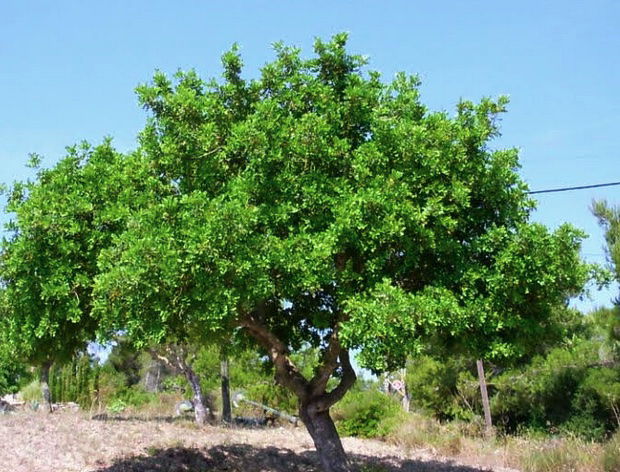 Pine
Pine
Pine trees generally are only pruned every seven to eight years. This pruning usually consists of canopy thinning and reshaping and general thinning to allow air to pass through it. The pruning is carried out in Autumn to allow the tree to ‘recover’. Pruning pine trees in winter can cause the tree to become weak or even die, whilst pruning pine trees in summer can leave the tree vulnerable to insect and beetle attack.
In addition, the removal of the top of a pine tree is not recommended as it significantly raises the chances of tree disease and death. Many pine trees that are ‘topped’ sicken and die. A pine tree that has had its top removed will not recover and won’t simply grow a new top. This is particularly relevant as we are often asked to remove the tops of pine trees to provide, or restore, a view.
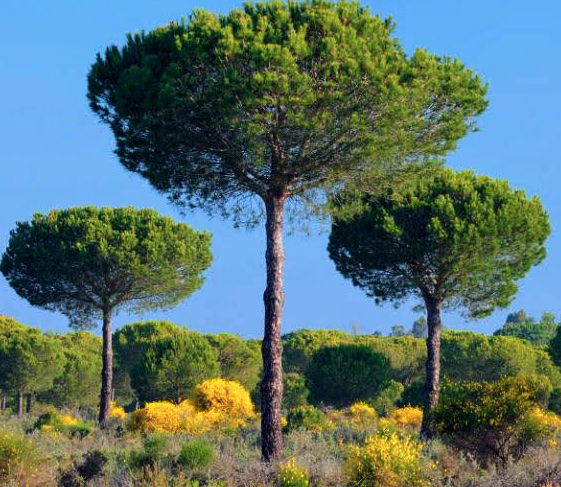 Olive
Olive
The olive trees within MLN are mostly very old and established, often hundreds of years old. Any removal, cutting or trimming should be carefully considered. Olive tree shape, like the Carob, is established when the tree is young, with little being able to achieve later in its life as branches will often separate multiple times causing the entire tree to become unruly and wild. That said, as with most trees, there is a natural wild beauty in a tree untouched by human.
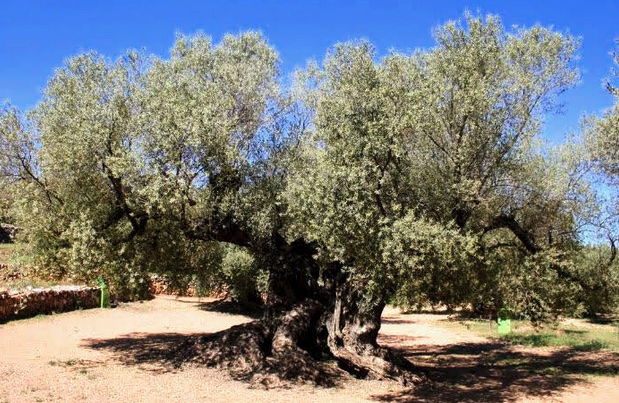
We appreciate this can be a significant source of dissatisfaction, so, in an attempt to aid those requesting the cutting, pruning or removal of trees, and in some cases, bushes, we have listed below a list of frequently asked questions taken from emails received, together with the Committee's response.
Q. Do I have a right to a view?
A. No, You have no legal right to a view, even if the agent you bought your home through suggested you may have or suggested you could cut down trees and prune trees and plants that obstruct your view (which has happened previously) The MLN Committee are also under no obligation to provide a view, however, where possible, we are sympathetic to requests dependent on circumstances.
Q. Can I request for a tree to be pruned?
A. Yes. However, please be aware that we have a large volume of trees, and it is impossible to prune every one of them every year. We typically prune the large trees at a specific time of year, and we also need to hire a "cherry picker" to reach the high trees, which is costly. There are also strict rules and laws around the pruning of trees, so please consult with the committee and ideally provide photos of the tree in question.
Q. Can the committee request the pruning, or removal of a tree on my neighbour's land ?
A. Yes, however we encourage owners to discuss matters like this with their neighbours directly in the first instance. If this is not possible, we are happy to contact them via email on your behalf and put you in touch with each other (if the other owners are ok with us passing on your details). Please note that we cannot force any owner to remove or prune a tree unless it is considered a hazard, at which point we would inform the council if the owner is reluctant to comply.
Q. Can I apply to the council to remove a tree on MLN Community land?
A. No, this can only be done by the serving committee. Any tree, or plant, on communal land that is damaged, cut, pruned, or removed without committee knowledge, or authorisation, will breach the MLN rules and could potentially result in fines being applied by the Town Hall. If you require something removed, cut or pruned, please contact the MLN committee.
Q. Can I request for a tree on MLN community land to be cut down?
A. Yes, you are perfectly entitled to ask. However, permission will not be granted unless the tree is causing structural damage or is a hazard. In the case of structural damage, the committee will need to ensure that the structure was not built too close to, or built after, the tree was already in place. The removal of the tree may also be subject to permission being granted by the Town Hall.
Q. Can I cut down my tree that is on my land?
A. Possibly, however the decision may not be up to the committee; Depending on the situation, you may need to obtain a licence from the council to carry out the removal. Without this, you could be subject to large fines from the council. Please consult with the committee in the first instance as we may be able to advise. We may also need to prepare for any potential disruption. You will also need to ensure your contractor is fully insured in case they cause unexpected damage to your neighbours or MLN land.
Q. How do I apply to the council to cut down a tree on my land?
A. If a tree needs to be removed, you are required to submit an application, and the council sends an inspector to view the tree. You must have a VERY good reason to be removed, such as being a safety concern, causing damage, or being diseased.
If the council agrees to issue a licence for the tree removal, you have to provide a specified amount of replacement trees to the council. The council will then plant those new trees elsewhere in Mijas. This is typically expensive. For example, in 2021, a resident had to pay €1,000 for ten new pine trees to remove one pine tree causing damage to the MLN water pipe.
When you add this cost to the cost of the tree surgeon and disposal costs, it is expensive. The price is linked to the type of tree you are removing.
Q. Why are so many rules associated with pruning and cutting down trees?
A. Mijas Council is so strict on trees not being removed for multiple ecological reasons. The most obvious is that we live on the side of a mountain, and the trees provide a vital service in "soaking up" excess water in the heavy rain seasons to avoid flash floods. This is even more important now that we recently lost thousands of hectares of trees and vegetation in the devastating wildfires around the mountains of MLN.
Q. I ́ve seen a caterpillar nest in a pine tree. What should I do?
A. You should avoid contact at all cost and report any sightings to the MLN Committee. In Spain, pine, and oak trees often become infested with Processionary Caterpillars. This particular species can be harmful to young children and sometimes fatal to cats and dogs. These caterpillars make nests that look like candy floss and travel down the trunk walking ‘conga style’ across the ground, hence the name, Processionary Caterpillar. Here at MLN we spray our trees to prevent Processionary Caterpillars and pine beetles.
Q. Do I have to spray the pine trees on my land?
A. Yes, It is imperative that you spray your pine trees. You should engage a contractor to carry out the spraying or speak to the MLN Committee who can arrange for this to be done for you (there will be a charge depending on the size, and the number of trees). We cannot emphasise enough the importance of spraying ALL of the trees within MLN as Processionary Caterpillars and pine beetles do pose a serious risk to both animals and humans.
Please see below extracts from a Decree that was provided by the Mayor of Mijas in 2010:
- Tree pruning shall be carried out following rules based on science and professionalism, which gives preference to ecological balance criteria.
- It is necessary to keep the branch structure, so pollarding (cutting the top) and flush cuts (removing a branch flush to the trunk) are forbidden.
- Cutting of branches with more than 8 cm of diameter shall be avoided, with the exception of certain special cases where that is justified.
- Pruning should be done by removing lower side branches and opening the canopy of foliage to allow light and air throughout the tree.
- Never remove, in one go, more than one third (33%) of the live foliage.
- Pruning shall be carried out during their vegetative rest period, unless expressly authorised otherwise.
- The pruning shall not damage or interfere with bird life and therefore the areas where they normally are and the periods when they are nesting shall be respected.
- The works shall be carried out by a qualified professional staff.
Further reading:
Tree Varieties and how to care for them
Please note: All established trees in Spain are protected by law - any requests for the removal, cutting or pruning of trees should, in the first instance, be referred to our gardening consultant, Lazaro. Please email the committee for guidance.
Carob
The Carob tree is known as a ‘wild tree’, which means they are generally left to grow without pruning. If a tree hasn’t been pruned to shape when it was young, it’s likely to be wild and unruly as it ages. Once fully grown, there isn’t a great deal that can be done to shape it other than light pruning to allow air and light to penetrate the interior. Young stems can be removed without affecting the production of the carob seed. In general, the removal of tangled, weak, damaged or diseased branches is all that is required.
It is also important to note that Carob trees are protected by law, with every tree mapped using GPS coordinates and recorded. Carob trees cannot be removed without permission.
 Pine
PinePine trees generally are only pruned every seven to eight years. This pruning usually consists of canopy thinning and reshaping and general thinning to allow air to pass through it. The pruning is carried out in Autumn to allow the tree to ‘recover’. Pruning pine trees in winter can cause the tree to become weak or even die, whilst pruning pine trees in summer can leave the tree vulnerable to insect and beetle attack.
In addition, the removal of the top of a pine tree is not recommended as it significantly raises the chances of tree disease and death. Many pine trees that are ‘topped’ sicken and die. A pine tree that has had its top removed will not recover and won’t simply grow a new top. This is particularly relevant as we are often asked to remove the tops of pine trees to provide, or restore, a view.
 Olive
OliveThe olive trees within MLN are mostly very old and established, often hundreds of years old. Any removal, cutting or trimming should be carefully considered. Olive tree shape, like the Carob, is established when the tree is young, with little being able to achieve later in its life as branches will often separate multiple times causing the entire tree to become unruly and wild. That said, as with most trees, there is a natural wild beauty in a tree untouched by human.

Vehicles & Parking
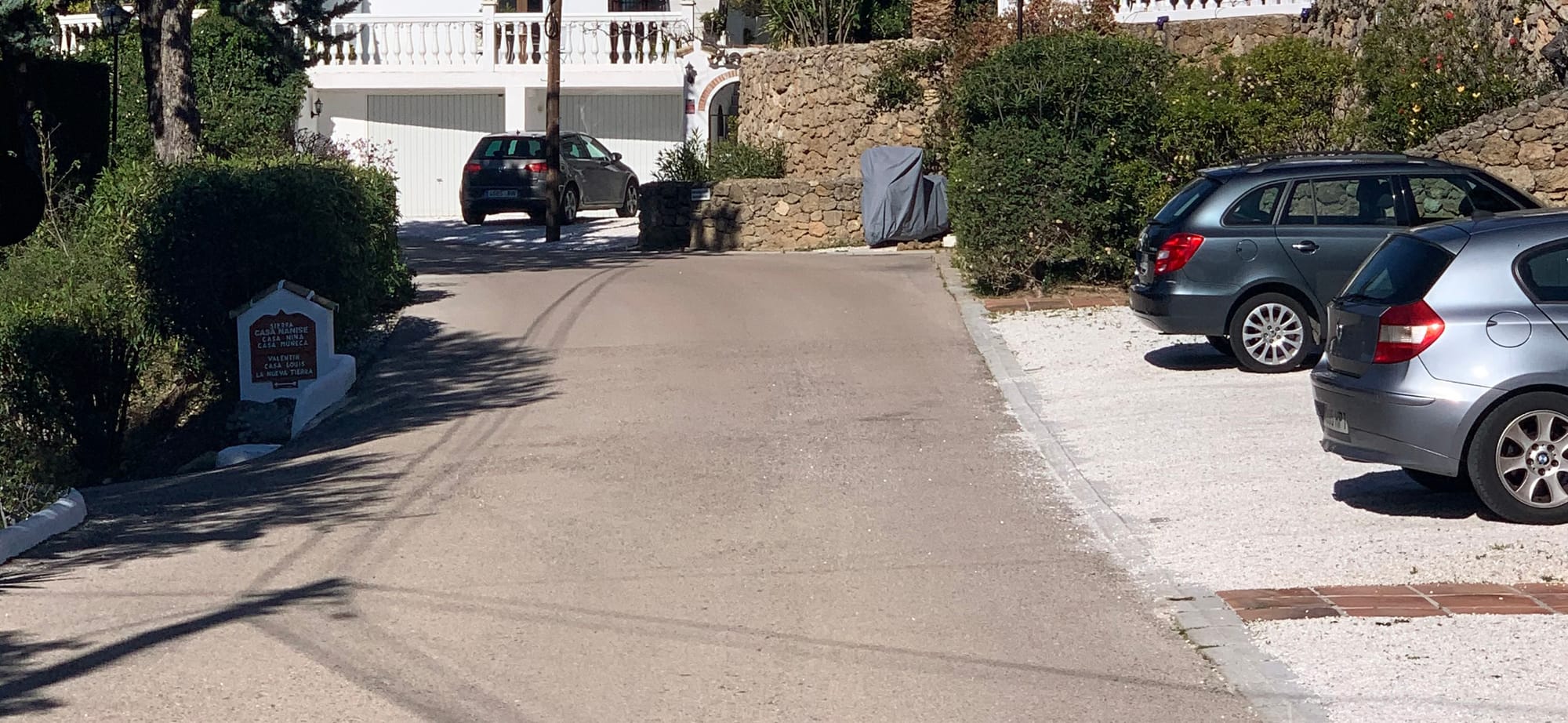
- Vehicles must be parked within the designated public parking areas.
- No Parking on the roads.
- Washing of vehicles on the public roads or parking areas is not allowed.
- Large vehicles must be parked in the car park adjacent to the community office.
- Vehicles left on the Urbanisation for long periods must be parked in the car park adjacent to the community office.
- No caravans, campers, motorhomes, or tents can be used as accommodation anywhere in the Urbanisation.
Waste and refuse
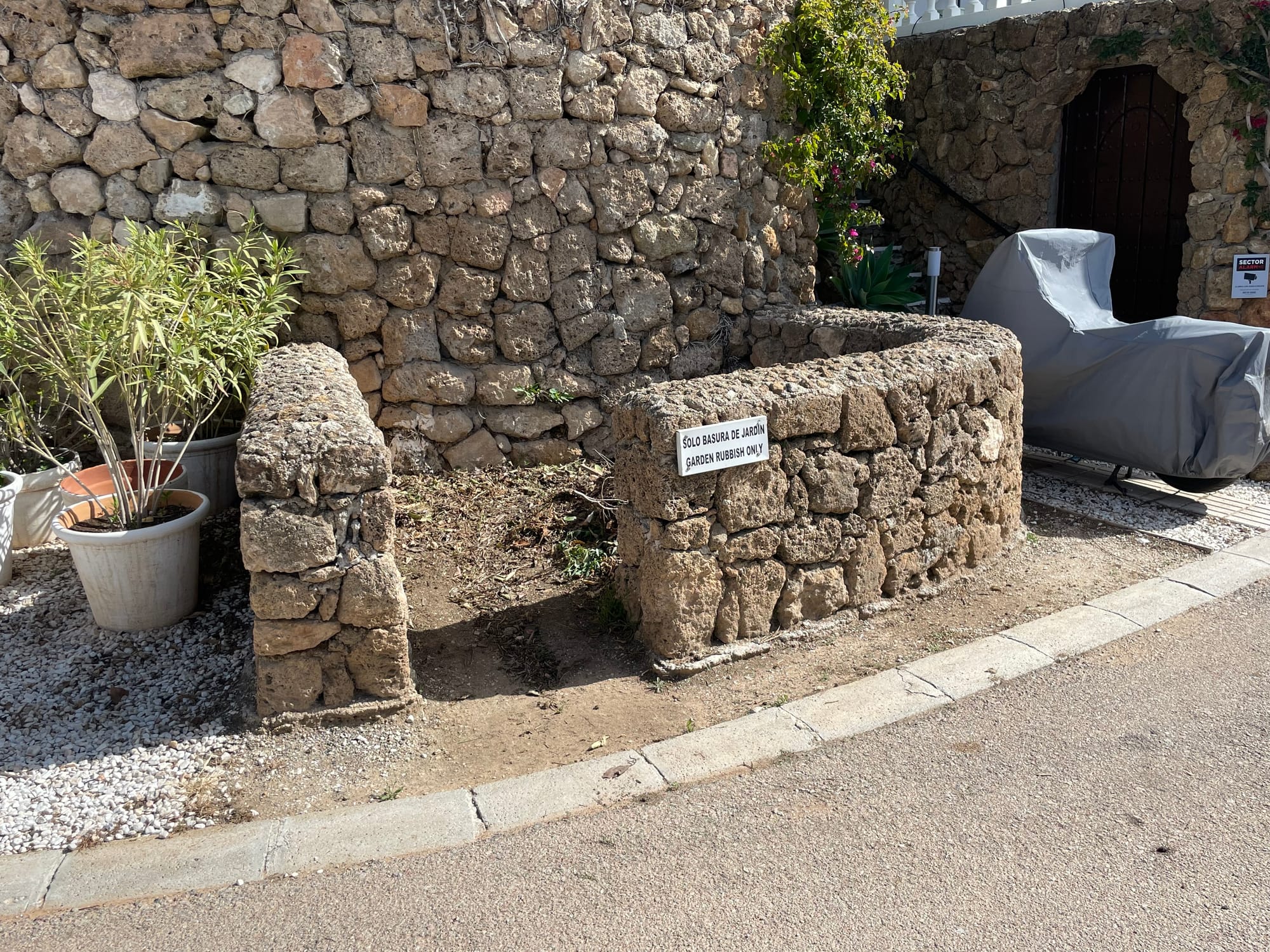
- Do not deposit any domestic rubbish, bbq ash or dog poo bags, or any other waste in the garden refuse (Basura) areas. This includes bin bags filled with garden waste. BBQ ash has started fires previously, and it is extremely hazardous.
- The burning of any garden refuse is not allowed.
- Please deposit garden refuse in the designated garden refuse areas.
- Domestic rubbish must be disposed of at the appropriate designated collection points. There are none of these actually in our Urbanisation.
Pets
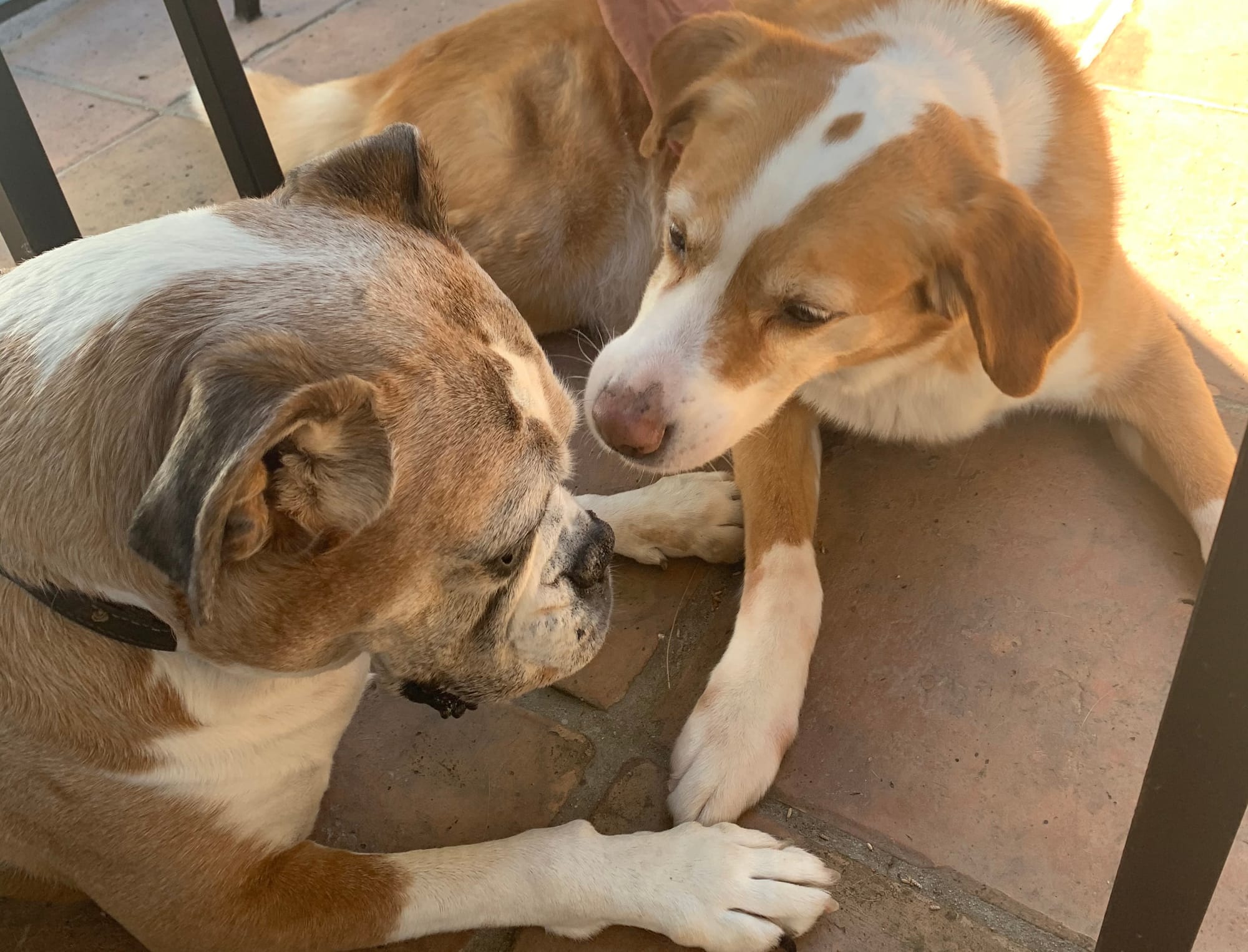
- The law requires that dogs should be kept on a lead in all public areas.
- It is obligatory to clear up any mess caused by pets. It's also a legal responsibility of owners to carry water to rinse off any area urinated by a pet.
- Dogs are not permitted in the communal pool areas.
- Please respect your neighbours by not permitting dogs to bark for prolonged periods.
Building works & walls
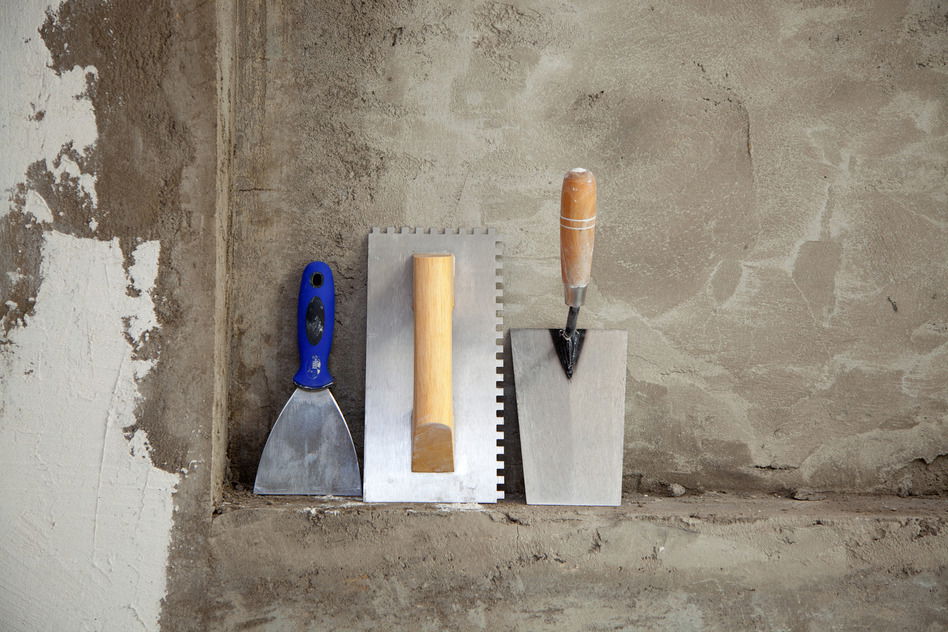
- The Plan de Parcial de Ordenacion designates Mijas La Nueva as that of a Mediterranean Village and its characteristics should be sympathetically maintained.
- Please inform the MLN Committee of any proposed building work or alterations before starting any building works. By telling the committee, any potential confusion or frustration with fellow residents can be avoided, especially when we understand the duration and nature of the work and know those works will not illegally affect communal lands or any of the MLN statutes. It is the Owners' responsibility to obtain any necessary Town Hall permissions or licenses to validate the works comply with Spanish law.
- There are minimum separation lines of 3 metres from the exterior buildings, public roads, and boundaries. Permission must be sought from adjacent or involved parties to vary this separation distance.
- Garden walls should be no higher than 70cm. Walls should be constructed with materials in accordance with the aesthetic characteristics of the Urbanisation.
- Hedges should be a maximum height of 220cm.
- Any materials left on roadways for a prolonged period can be removed by MLN community personnel at the Owner's expense.
- Work, transport of materials and use of machinery is only permitted between 08.00 and 20.00 on weekdays, excluding public holidays.
- Please follow the Building Work Checklist. This can be found under Useful Information/Printable Downloads section of this website.
Renting guidelines
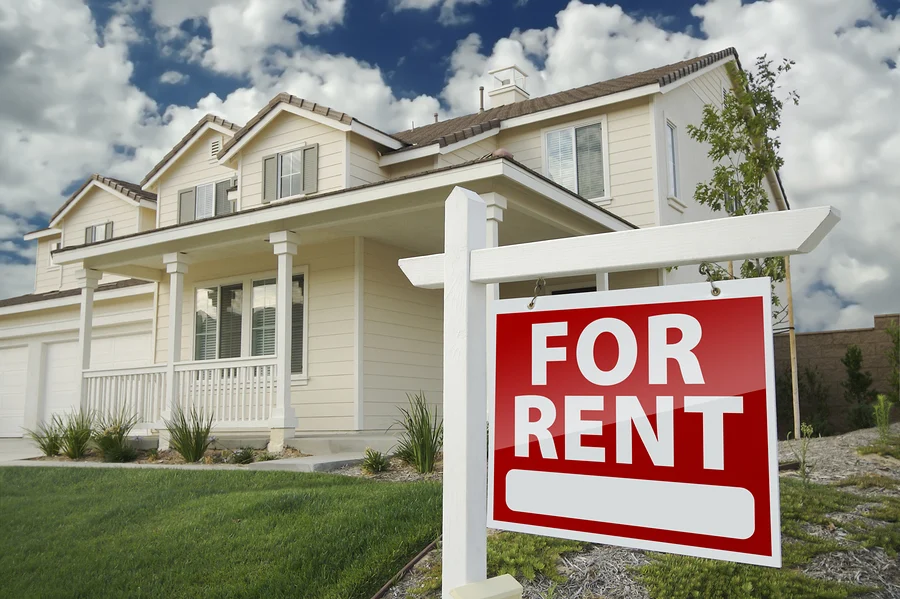
- Owners who rent to holidaymakers, please ensure that your renters respect the community rules about noise! Please remember that MLN is a residential area! The police will be called if this is not respected, leading to fines that you will be responsible for paying!
- Whether renting or otherwise, all property owners must ensure that their tenants, guests, family, or friends understand, respect, and comply with the Urbanisations rules and good neighborly ideals. Please display the MLN rules in a visible area & ensure they are read.
- Owners are legally responsible for damage caused to community property and facilities by their tenants, guests, family, friends, or contractors.
- If you rent your property for an extended period (non-holidaymaker), we encourage you to inform the committee and provide the renter's details. This is so that we can include them in communications if, for example, we have a water or power issue.
Miscellaneous

- Water is a precious and expensive commodity and every effort to prevent waste is encouraged. Please use automatic watering systems sparingly.
- No signs, posters or announcements of any kind should be displayed anywhere on the Urbanisation. (Including For-Sale boards)
- No residential properties are allowed to be for business purposes with the obvious working from home office exception.